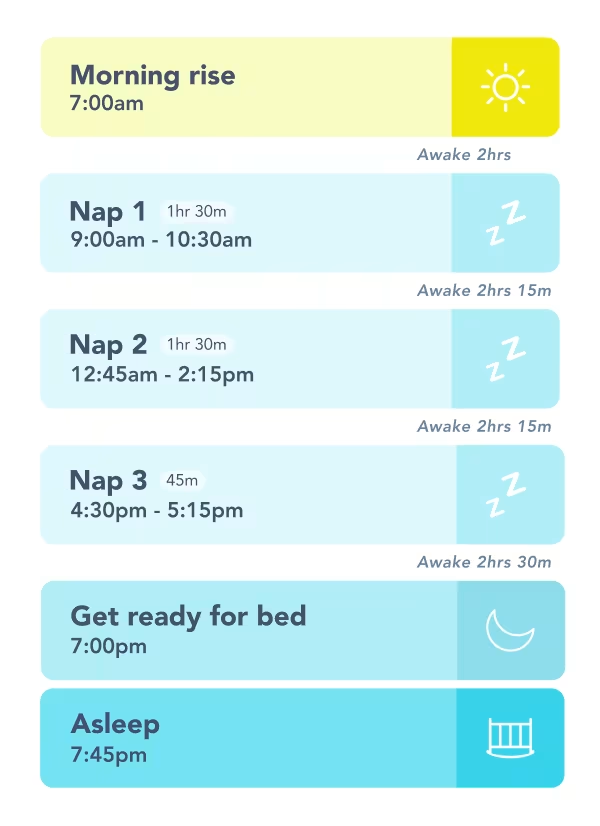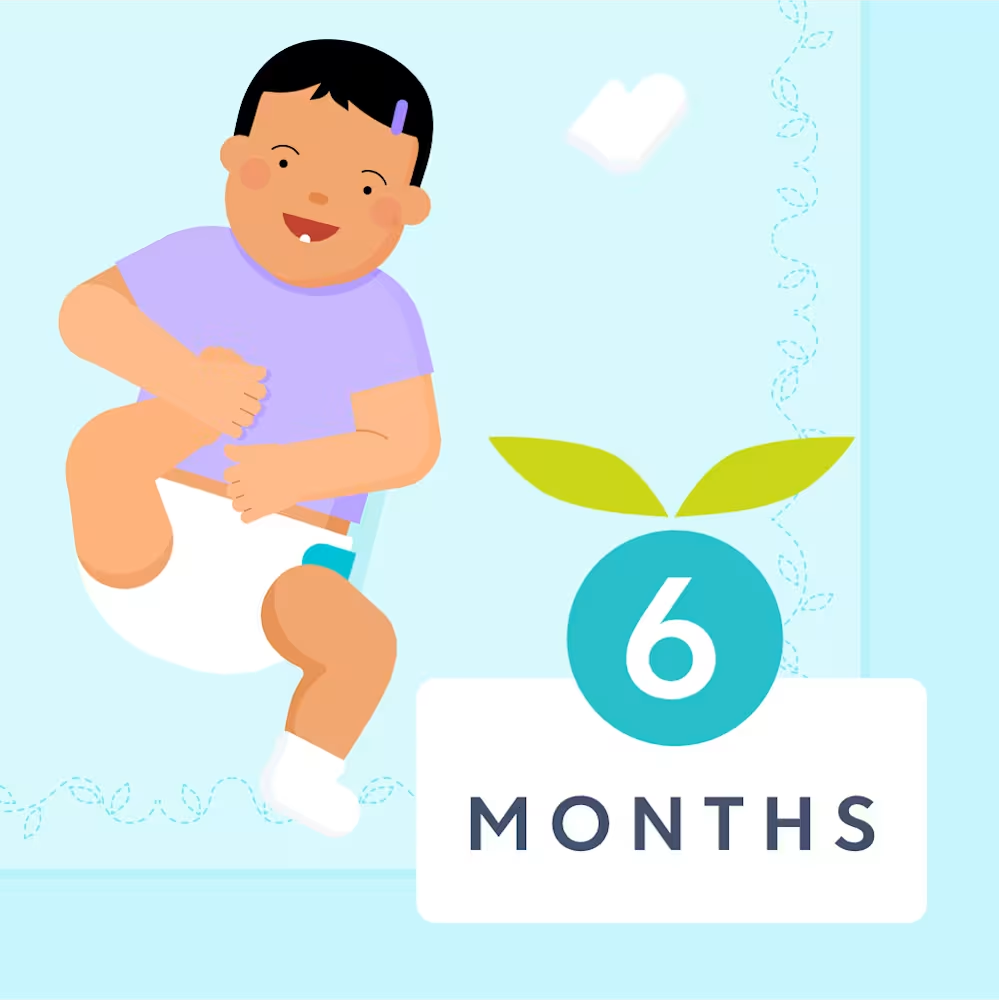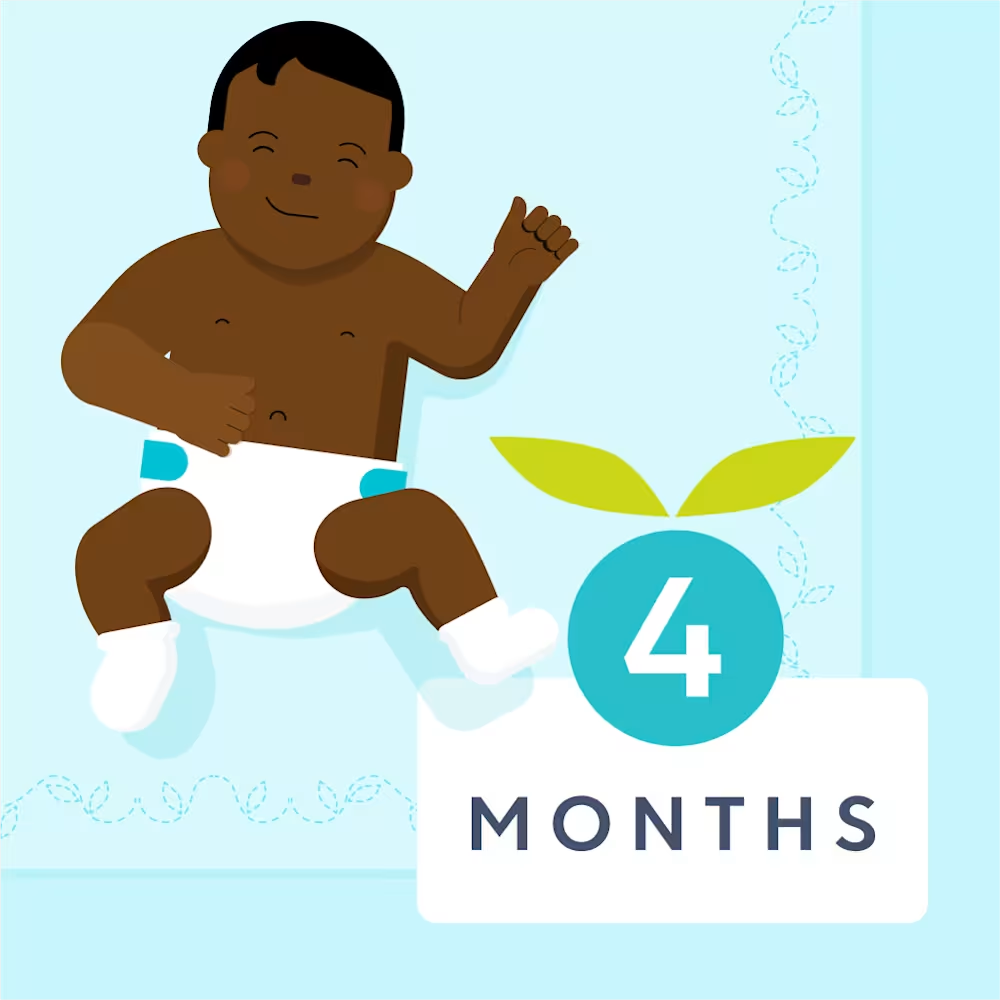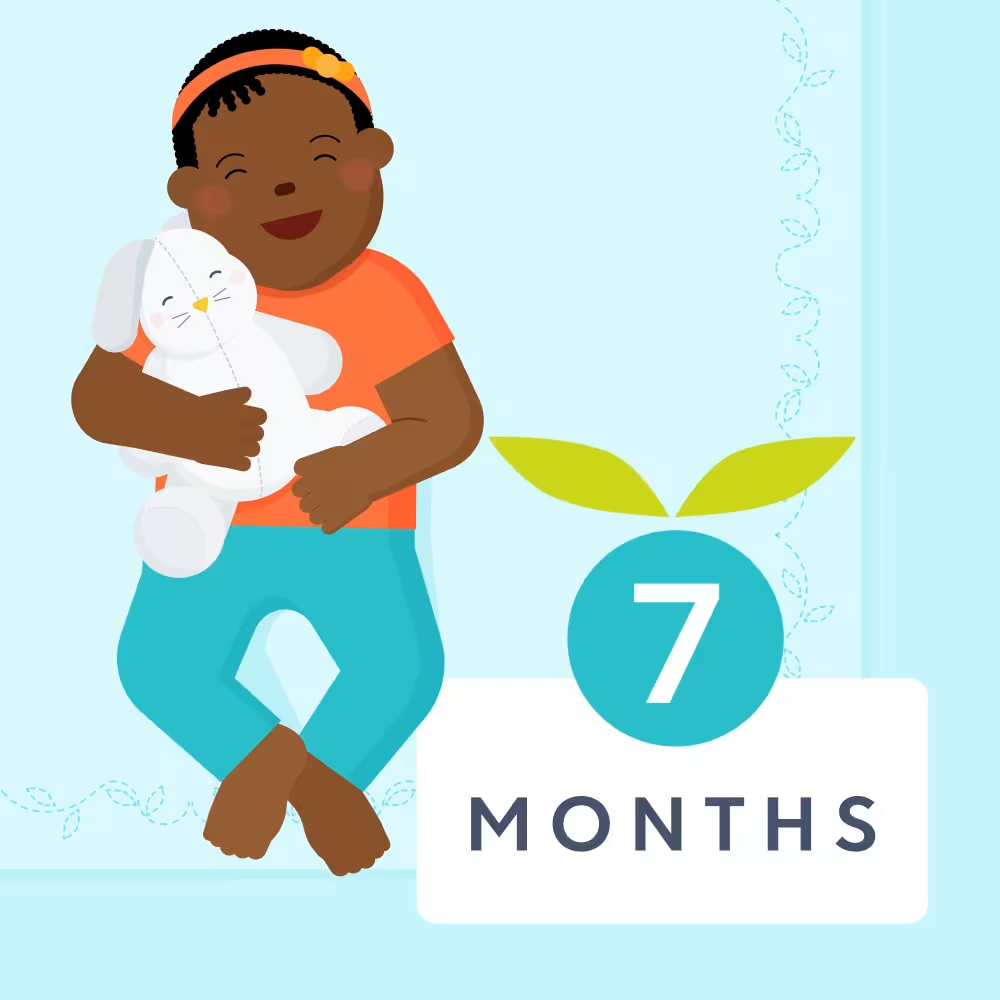5 month old sleep schedule: Bedtime and nap schedule
Updated Dec 15, 2025

At, the first two naps of the day should start to lengthen, meaning a transition to a 3-nap schedule for those babies still napping 4 times a day. Once your baby transitions to 3 naps, their sleep schedule starts to become more predictable! Read on to discover what to expect for your 5 month old’s sleep schedule.
How much should a 5 month old sleep?
At this age, we recommend striving for about 14.5 hours of total sleep over a 24-hour period []. This typically looks like 11 - 12 hours at night, and 2.5 - 3.5 hours during the day spread out over 3 - 4 naps. Remember, when it comes to baby sleep, there's a range of normal and that’s expected ! The suggested hours are just a rough estimate, and it's always wise to keep an eye on your little one's mood and energy levels too when you’re evaluating if they’re getting enough sleep.
Babies who can stay awake for an average of 1.5 - 2.5 hours between sleep periods usually take 4 naps a day. In order to transition to 3 naps, the wake times for a 5 month old will need to be a bit longer. A baby will need to be able to comfortably stay awake for 2 - 3 hours of awake time to make a 3-nap schedule work. Keep in mind there’s often a nap transition period, though, where your baby may take 3 naps one day and 4 naps the next. While this can make it frustrating to plan your day, this is temporary! Alternating between 3- and 4-nap days can allow your baby to remain well rested as they adjust to staying awake longer.
Sleep fact for 5 month old babies
It’s common for babies to begin rolling over at this age. Typically, they first roll from stomach to back [], though that is not always the case! Many will be able to roll both directions by about 6 months of age. If you notice your baby has rolled onto their stomach after you placed them on their back to sleep, consider giving them a few minutes to see if they can flip back over on their own before you intervene. Be sure to give them plenty of tummy time [] to practice rolling over during the day!
Safe sleep guidelines from the American Academy of Pediatrics recommend that parents always lay babies up to 1 year of age on their back for sleep. However, they may let their baby sleep in whatever position they move into [] once they can roll in both directions (as long as the baby is unswaddled, healthy, and their sleep space is safe). Speak with your pediatrician to determine any guidance specific to your baby.
Sample 5 month old sleep schedule

Note: Sleep needs vary by child and this chart should be viewed as an example.
Morning rise: 7:00 AM
Wake window before first nap: 2 hours
First nap: 9:00 AM - 10:30 AM (1.5 hour nap)
Wake window before second nap: 2.25 hours
Second nap: 12:45 PM - 2:15 PM (1.5 hour nap)
Wake window before third nap: 2.25 hours
Third nap: 4:30 PM - 5:15 PM (45 minute nap)
Get ready for bed: 7:00 PM
Wake window before bedtime: 2.5 hours
Asleep: 7:45 PM
Naptime schedule for 5 month olds
Your baby may have transitioned to, or will be doing so soon. Once a baby has dropped the fourth nap, most need 2 - 3 hours of awake time between sleep periods to be sufficiently tired but not overtired. You may worry about a” or” around this time (especially after going through the”) but don't fret! Short naps are still very common and age-appropriate for a 5 month old baby’s sleep schedule. so don’t worry if your baby isn’t taking long, predictable naps at this point.
How long should a 5 month old nap?
Babies this age aren’t always able to link sleep cycles during the day, meaning it’s not uncommon for sleep durations to be 30 - 45 minutes. However, we expect the first 2 naps of the day to start lengthening to 1 - 1.5 hours at around 5 months. If your little one isn’t lengthening any naps yet, their wake windows may still be a bit too short. Some babies are able to extend their naps once their wake windows are slightly longer, so adjusting wake times may help.
On the other hand, if your baby is taking longer naps, consider capping each individual nap to 1.5 - 2 hours. When naps are too long, they can take away from the sleep your baby needs later in the day and overnight. Keeping naps within this range helps ensure there’s enough sleep pressure for restful nights and balanced daytime sleep.
How many naps are expected for a 5 month old?
The common range is 3 - 4 for a 5 month old nap schedule. Some babies will still need 4 naps a day at 5 months old, which is OK. Once a baby is able to stay awake for longer periods, they’ll transition to 3 naps a day. We find that babies who fall asleep independently at naptime are more likely to link their sleep cycles and comfortably stay awake for longer periods, which typically leads to fewer naps each day.
3-nap schedule
4-nap schedule
Bedtime for 5 month olds
At this age, we recommend planning bedtime according to wake windows, rather than following a strict bedtime. If your baby takes short naps or skips a nap, bedtime will likely need to be adjusted earlier that day to limit overtiredness.
What time should a 5 month old go to bed?
Most babies this age are ready for night sleep between 6:00 PM and 8:00 PM. However, the ideal bedtime for your baby will vary according to a few factors. You’ll want to consider your baby's morning wake-up time, how well they’ve napped, and how much awake time they need before bed. Most 5 month olds need 2 - 2.5 hours of wakefulness between their last nap and bedtime. However, a baby closer to 6 months of age may need closer to 3 hours of awake time before bed.
Why does my 5 month old keep waking up at night crying?
Babies at 5 months briefly wake up between sleep cycles due to a biological alteration in the way they sleep that happens around 3 - 4 months (often called the “”). If your little one can’t fall back to sleep on their own between sleep cycles, they will likely cry out to you for help overnight.
Other reasons for night waking at this age include hunger, teething pain, illness, parent-led sleep associations (like being held, rocked, or fed to sleep) and mastering milestones (like rolling).
Is there a sleep regression at 5 months old?
While there isn’t a specific “5 month sleep regression” that happens as soon as your baby turns 5 months, there are factors at this age that may contribute to bumpy sleep. As mentioned above, your baby’s sleep patterns start to mature around . If your little one started waking more frequently overnight around that time and sleep challenges have carried over to 5 months, you could call this a “5 month sleep regression.”
Sleep regressions don’t have a definitive “end,” unfortunately. However, ensuring your baby follows an age-appropriate sleep schedule, falls asleep independently, and can link sleep cycles may help them get the rest they need. If you’d like extra support in the sleep department, consider a step-by-step customized Sleep Plan via .
Can my 5 month old sleep with a pacifier?
At 5 months, it’s safe for your baby to sleep with a pacifier. Doing so may help soothe them during sleep times (and awake times too). On the other hand, at 5 months your baby may become distraught if their pacifier falls out of their mouth while they’re sleeping and cry out for you to replace it. Note that the AAP does not recommend forcing your baby to take a pacifier or using it to delay (or replace) feedings that are vital for growth and brain development [].
Should I swaddle my 5 month old?
At 5 months most babies should not be swaddled because they are likely rolling over or trying to roll. According to safe sleep guidelines from the AAP, if your baby is attempting to roll back to front or front to back (or has successfully rolled), it’s no longer safe to restrict their arms for sleep [].
If your baby is having trouble adjusting to sleeping without a swaddle, there are some like transitional swaddles and sleep sacks. These items provide comfort like a traditional swaddle but don’t restrict a child’s arms.
Can I sleep train a 5 month old?
Sleep results may vary at . Some babies may respond well to sleep training techniques at this age, while others may have up and down progress as their sleep patterns continue to develop. If you want to sleep train at this age, this is a good opportunity to practice independent sleep skills even if your baby isn’t able to master them quite yet.
Can a 5 month old sleep on their stomach or side?
The AAP recommends that 5 month old babies always be placed on their backs in their sleep space []. However, your baby may be able to roll at this age. If this is the case and they can comfortably roll front to back and back to front, you can let them sleep on their stomach or side if they move positions while sleeping. Babies are usually working on rolling between 4 - 7 months [].
What are the developmental milestones for a 5 month old?
Your 5 month old may be working on like rolling, sitting up with support, and focusing on colors. However, there’s a range of normal when it comes to baby development. If your baby isn’t doing all of these things yet, that’s OK! Every child develops at their own pace. However, reach out to their healthcare provider if you notice any red flags or have concerns about their growth and brain development.
Practice rolling skills
Move and wiggle arms and legs purposefully
Sit up with support
Reach and grab objects with both hands
Bang item on a hard surface
Babble sounds like “baba”, “goo,” and “gaga”
Blow raspberries by 6 months
Focus on colors and patterns
Stare intently at toys
Maintain eye contact for a longer period
Express emotions through different sounds
Interest in social games like peek-a-boo
Enjoy interacting with toys, especially with varied textures and colors
Does a 5 month old need to eat during the night?
Some babies may be able to go for long stretches without eating overnight while others at 5 months may wake up hungry. It’s common for babies to still have at 6 months. Reach out to your child’s pediatrician or a lactation consultant for guidance if you have specific questions about your baby’s nutritional needs.
Takeaway
We recommend striving for about 14.5 hours of total sleep over a 24-hour period at 5 months. This looks like about 11 - 12 hours at night, and 2.5 - 3.5 hours during the day spread out over 3 - 4 naps. However, sleep needs do vary.
Most babies will switch to a 3-nap schedule around this time. However, there may be a transition phase where some days they take 3 naps and some days they take 4. This is normal as little ones get used to staying up for longer periods.
If your child can roll both ways (back to front and front to back) on their own, it’s OK to let them sleep in whatever position they move into as long as they’re unswaddled, healthy, and in a safe sleep space, per AAP safe sleep guidelines.
At this age, we recommend planning bedtime according to wake windows instead of following a strict “by the clock” bedtime.
If you're curious about what lies ahead, glimpse into the future to see what you might experience once your baby is on a. Also check out what you may expect for over their whole first year. While you're at it, see how far your baby has come by looking at a.
Share article:
Note: The content on this site is for informational purposes only and should not replace medical advice from your doctor, pediatrician, or medical professional. If you have questions or concerns, you should contact a medical professional.
7 Sources
Share article:









